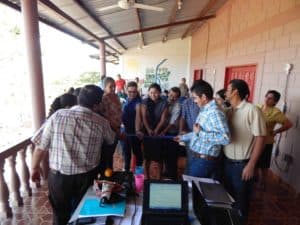
February 11, 2015
Girls from families of limited resources between the ages of eleven and fifteen living in the frontier region of Intibucá, Honduras, hear a chorus of “You can’t” messages. You can’t escape the generational poverty in which you were born. You can’t go to school beyond the sixth grade. You can’t succeed or be productive on your own. You can’t survive without the protection and support of a man. The chorus reverberates in her body, her being, debasing her very identify. With head and eyes to the ground, a weak voice speaks with hesitant subservience, “I can’t.” It is not a wonder that placed in such a vulnerable position of degrading self-esteem, the girl finds herself with a child. Perhaps the only recompense to the “You can’t” chorus, she can at least bring life into the world. But nothing else has changed, the “You can’t” chorus sings ever louder, and the demeaning chant echoes into another generation.
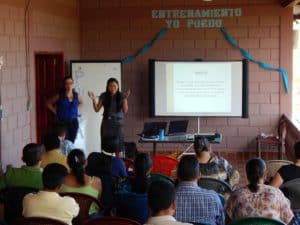
The victim becomes a victor only when she can find a power greater than the power that defeats her. If those voices are left unchallenged, if there is no alternative chorus, there is little hope for anything other than “You can’t” becoming “I can’t.” Shoulder to Shoulder is singing out a new refrain. It is a song of empowerment, girl empowerment. This simple melody says “You can.” When that beat is internalized it becomes “I can!” (¡Yo Puedo!). Believing “I can” overcomes and silences the chorus of “You can’t.” We sing “You can,” they sing “I can,” and soon everyone hears it and joins in. One day, the “You can’t” chorus will become less than a whisper of a remembrance. The powerful, soul moving rhythm of I can, Yo Puedo, will empower a new and liberating dance of joy.
The teacher training for the Yo Puedo Girl’s Empowerment and Sexual Health Program was held last Friday, February 6, 2015 in the Shoulder to Shoulder Clinic in Concepción. Minsis Ramos Diaz, Yo Puedo Program Coordinator, and Kate Clitheroe, StoS Director of Programs, led the twenty-four 5th and 6th grade teachers, representatives of the fourteen Yo Puedo Schools. The success of the program is readily apparent in the enthusiasm and dedication of the teachers. They already intone the new chorus line. The school in Magdalena has done so well that they were able to donate funds toward incorporating more schools into the program. Two new schools were inducted into the program.
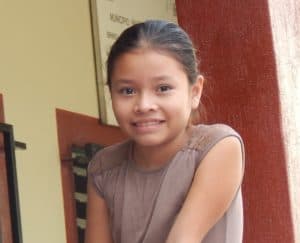
The program is growing, changing the rhythm, the tone, and inviting others to join in a new chorus. Schools were introduced to a new empowerment manual presenting topics in communication, self-esteem, peer pressure, decision making, and sexual health. Cedric Clitheroe, a new Shoulder to Shoulder volunteer, craftsman, and small businessman will begin trainings for teachers and girls on jewelry making and successful business strategies and techniques. A new contract was signed by the teacher representatives, committing to the ongoing success of the program. Finally, an evaluation tool to measure the short- and long-term outcomes of the program was introduced for implementation.
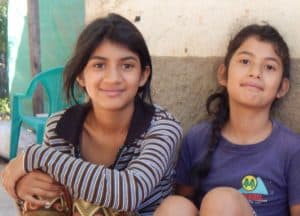
The beat reverberates more profoundly, the chorus is becoming stronger, and the old songs of “You Can’t” are fading. Shoulder to Shoulder wants to keep playing this song. To learn the song, read more about us at Yo Puedo. To join the chorus, to add your voice to an empowering song, visit us at Donate to Yo Puedo.
Not in Wisconsin Anymore…
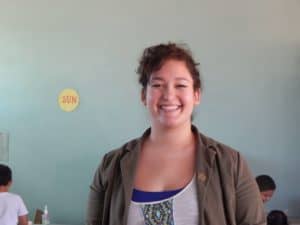
February 2, 2015
My bias toward Wisconsonian culture is primarily based on the limiting view of crazed Green Bay Packers fans wearing cheese wedge slices as hats. Additionally, as a haughty, New England, right coaster, I lump Wisconsin, Michigan, and Minnesota together. It’s really, really, really cold there, two or three days of summer in August at the most, and anyone purposely living under those conditions is very suspect. There aren’t any cities, everyone is a rural farmer, and the Lutheran Church forms everybody’s moral conscience. I blame the latter on NPR and Garrison Keillor. My bias of Wisconsin provincialism and narrow-mindedness was well-formed until just recently.
In January, Marcia LaSalle, a Milwaukee, Wisconsin native, arrived in Camasca, Intibucá, Honduras to begin four months of volunteer service at the Good Shepherd Bilingual School. Though her surname is French, her father is Puerto Rican. Her home life implied cultural diversity even as her mother, by Marcia’s own description, might have stepped right out of a Leave It To Beaver episode. Marcia visited Puerto Rico and her grandparents in Aguadilla, PR as a child and is close to many family members on her father’s side. Thus, she was acquainted with Spanish, but her father chose not to speak Spanish in the home. Marcia is very proud of her Latina heritage and wished she had learned more Spanish as a child. As a 21 year old adult, she is now becoming fluent in Spanish, having lived and traveled in Spain and now in Honduras. Not at all fearful or timid, seeking to expand her experiential horizon, she studied in England. The Wisconsin world traveler decided to spend the next four months in Honduras after completing the majority of her course requirements at St. Norbert’s College a semester early. When she returns in May she will have her BA in Anthropology.
Apart from that liberal, cosmopolitan, adventure-seeking, Wisconsin spirit, what brought Marcia to Honduras? A childhood friend spent some time here in Honduras with Shoulder to Shoulder. Whereas that had to have been influential, it’s perhaps best understood as presenting her the door to opportunity. Choosing to open that door was not in order to follow her friend, but to sate her own spiritual quest. Marcia witnesses an inner drive to meet and know others outside her own comfort zone. It is no surprise that she majored in anthropology. She admits to a fascination with culture. How is it that we can be so different, and yet so the same, and why? Most of us are content to be with others who act, think, and feel in similar ways. There’s a safety in sameness. But Marcia discovered that the best way to be pulled and challenged, to be self-reflective and to grow, is to feel just a little insecure around persons unlike oneself.
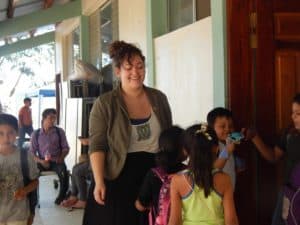
Marcia is at our bilingual school. Though she makes no claims on either being, or wanting to be, a teacher, she is present and sharing with the children. She’s teaching them English as they are helping her to hone her Spanish. They are communicating. More importantly, they are reaching out across culture, respecting that which is different and celebrating that which is the same. As a true anthropologist, Marcia is learning and teaching what is most important, even beautiful, about being human. Thanks Marcia. I will never again think of a Wisconsin with such limiting, narrow bias.
Perhaps you, even as you’re reading this, feel a certain tug to place yourself outside of your comfort zone. Maybe you would like to live in a developing country, serve and be served by the persons you would meet. Perhaps you have a little knowledge of Spanish, or a lot, or you just want the challenge of it all. If this describes you, maybe you should consider volunteering. Give it some serious thought. You can start by looking at the possibilities with Shoulder to Shoulder at https://www.shouldertoshoulder.org/volunteer-opportunities.
25 Years: The Dignity of Working Shoulder to Shoulder
 January 15, 2015
January 15, 2015
The 1969 war between Salvador and Honduras, sometimes referred to as the Soccer Wars or the Hundred Hours War, left many parts of Honduras bordering El Salvador isolated, with shortages of basic services and infrastructure. These effects last into the present day where, in the southern section of the department of Intibucá, services and infrastructure remain scarce and tenuous. In 1990, the small municipality of Santa Lucia suffered disproportionately the price of a war two decades past. Here there was no physician, no non-profits or relief agencies, no electricity, and the only water came from the community tap in the center of town.
Meanwhile at the University of Cincinnati, Dr. Jeff Heck, part of the junior faculty, was organizing a medical brigade to Honduras to be sponsored by Ruth and Daniel Castro from the Christian Medical and Dental Society of Honduras. Could any of the participants on that brigade really have known what they were getting into? Had they known, would they have gone? And what amazing things would spring forth from the innocence of their good will!! A team of twenty, including five physicians, slept on the floor at the school and municipal building. They worked from sunup to sundown and saw 4000 patients, assisted by the public health nurse, the only medical professional working in the area. The community asked them to return.

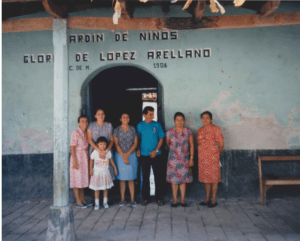
At this point, anything could have happened. The University of Cincinnati might have thought the project a folly and ended their support and funding. The project could have continued by way of sending brigades year after year to simply respond to physical needs. But what did happen was so much greater and so amazing. Relationships were forged, formed, and evolved, creating a synergy that profoundly transformed the lives of everyone committed to those relationships. In 1993, with money left over from a $1 million grant to study diarrhea among travelers to the tropics, construction on the first clinic began. A team of professional builders volunteered much of their time and talent, many of the building supplies were donated, and Chiquita Brands assumed the expense of shipping materials. Good will, service, caring, and the integrity of human relationship united to become a permanent site for healing and development.
After four or five years, Daniel and Ruth Castro suggested the name Shoulder to Shoulder, becoming interchangeable with Hombro a Hombro. Few organizations title themselves according to their philosophy. In extensive conversations among faculty at the university, among students and brigade participants, among community members in Cincinnati and Honduras, it was clear that this project would not survive or thrive save for the intricate participation of those served, the Hondurans themselves. The living of that philosophy was as much practical as it was ideal, given that so few from Cincinnati spoke Spanish and were only in Honduras once or twice a year. Whatever the motive, the philosophy secured the dignity of the persons served. Shoulder to Shoulder, Hombro a Hombro, became sustainable as Hondurans themselves took ownership of the service, care, and empowerment that has always identified its vision and mission.

Twenty-five years ago, a few professors, doctors, and medical students from the University of Cincinnati offered a hand of assistance to a desperately poor and oppressed people. They did so with respect, recognizing that Hondurans themselves would own and manage their health care and development. Shoulder to Shoulder was once small and from Cincinnati. Twenty-five years later, Shoulder to Shoulder/Hombro a Hombro, is big and from Honduras, Cincinnati, and the world. Shoulder to Shoulder once responded exclusively to the physical needs it encountered. Twenty-five years later, Shoulder to Shoulder/Hombro a Hombro, responds to the inherent dignity of all life and seeks to empower and develop relationships of liberation and justice.
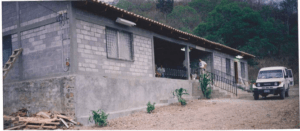
In tribute to Shoulder to Shoulder and in anticipation of the reunion brigade scheduled for May of this year, Dr. Jeff Heck reflects,
“Some of the best people I know have been involved with Shoulder to Shoulder from all walks of life, all with different perspectives, faiths and otivations. The majority have been motivated by a genuine concern for people left behind and have been willing to make great sacrifices on their behalf. Shoulder to Shoulder has done much to help physicians, nurses, dentists, and other health professionals restore their idealism that motivated them to join their professions in the first place. I count myself fortunate to have watched radical transformations in many people. Thus it is difficult to say who benefited the most: the Hondurans or the North Americans who came to ‘help’.”
All of this because twenty-five years ago, twenty people came to Honduras to offer some limited, medical service. Imagine!!


